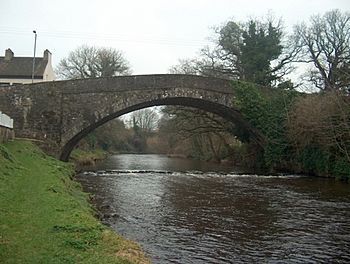River Moyola facts for kids
Quick facts for kids Moyola River |
|
|---|---|

Castledawson Bridge over the Moyola
|
|
| Country | Northern Ireland |
| Physical characteristics | |
| Main source | Sperrin Mountains |
| River mouth | Lough Neagh |
| Length | 27 mi (43 km) |
The River Moyola is a lovely river in Northern Ireland. It flows for about 27 miles (43 kilometers) from the Sperrin Mountains all the way to Lough Neagh. When it starts, the Moyola is a small river, only about 10 to 16 feet wide. As it travels, it gets wider, becoming a medium-sized river (16 to 65 feet wide). For its last few miles before reaching Lough Neagh, it turns into a large river, more than 65 feet wide. Long, long ago, this river was known as the 'Bior'. It even served as a border between ancient kingdoms called Fir Li and Ui Tuirtri.
The name Moyola comes from an old Irish phrase, Magh nÉola. This means Éolas Plain, which tells us a bit about the flat land around the river.
How the River Flows
Scientists measure how much water flows in the Moyola River near where it meets Lough Neagh. The area of land that collects water for this part of the river is about 304 square kilometers (117 square miles). On average, about 8.4 cubic meters (297 cubic feet) of water flow past this point every second. The most water ever recorded flowing in the river between 1971 and 2012 was a huge amount: 156 cubic meters (5,509 cubic feet) per second. This happened on January 19, 1988.
The land around the river has many different types of rocks, like limestone, schist, shale, and basalt. On top of these rocks, you can find layers of clay left behind by glaciers, as well as sand and gravel. Most of the land is covered in grass, with some areas of bog and heathland. The towns of Magherafelt and Maghera are also in this area. The Moyola River area gets about 1224 millimeters (48 inches) of rain each year. This is a bit more rain than the average for the whole United Kingdom.
The Moyola in Books
The Moyola River is often mentioned in the poems of Seamus Heaney, a famous writer from Northern Ireland. You can find it in his poems like Gifts of Rain and A New Song. Some people who study literature say that for Heaney, the Moyola River was as special as the River Derwent was for another famous poet, William Wordsworth.
Images for kids
 | Aurelia Browder |
 | Nannie Helen Burroughs |
 | Michelle Alexander |




